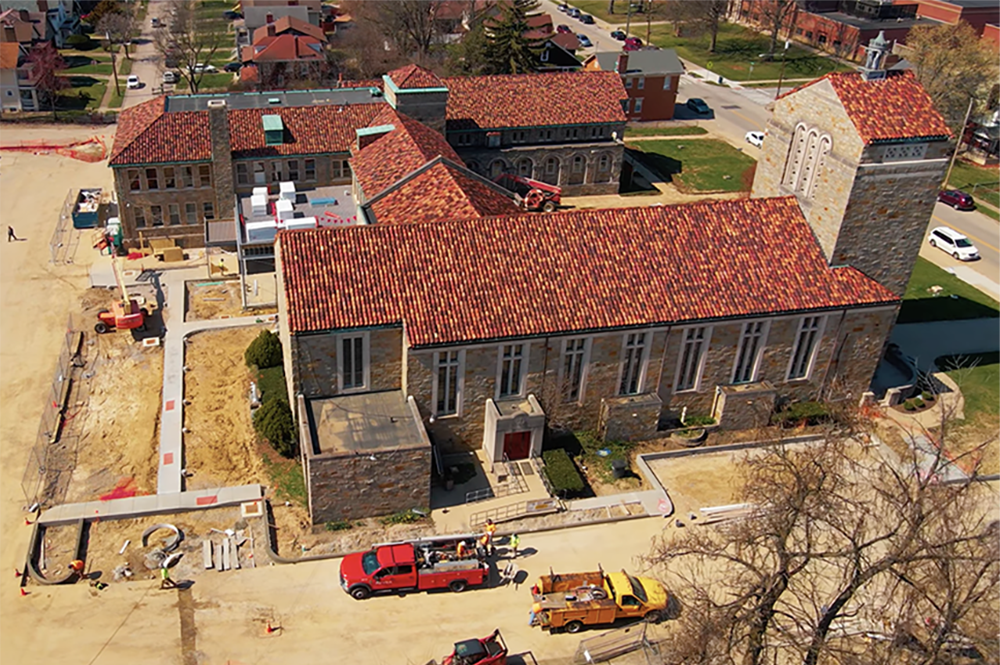
An aerial shot of ongoing construction of Xavier Jesuit Academy from an April 2024 video update. (NCR screenshot/YouTube/Xavier Jesuit Academy)
Throughout American education, the statistics are glaring: Boys are twice as likely to be diagnosed with attention-deficit/hyperactivity disorder; five times more likely to be placed in juvenile detention, and comprise only 40% of college students.
For minority youths, the gap is even wider. There are two Black women for every Black man graduating with a college degree.
The Jesuits, along with veteran educator and principal Kyler Chandler are working to make a dent in this education disparity. Chandler is the founding principal of Xavier Jesuit Academy, an elementary school which will open in August in Cincinnati's Bond Hill neighborhood.
Xavier Jesuit will begin with grades 3-5, expanding year-by-year into a full elementary school. The school has earned the support of the Jesuits, as well as Cincinnati's corporate community, including Procter & Gamble and the Cincinnati Reds, who have pitched in with labor and finances to pay for nearly $10 million in building renovations on a formerly shuttered Catholic school. Xavier Jesuit will also tap into Ohio vouchers, a subsidy for low-income students, paid for by a state school choice program.
Advertisement
The goal is to start young, says Chandler, who came to Ohio after 13 years as an assistant principal at his hometown University of Detroit Jesuit High School.
"It is planting seeds about the value of education," he told NCR about the plans to open Xavier Jesuit. The largely-Black Bond Hill neighborhood last had a Catholic school in the 1990s. Chandler and leaders of Church of the Resurrection took to the neighborhood to find out about educational needs. They returned with a sense that families shared concerns about how boys were being left behind by both public and Catholic school education.
They are looking at a formula including more male role models, longer school days and a connection with Catholic schools in Ghana.
Xavier Jesuit school days will run from 8 a.m. to 4:30 p.m. Cognizant of studies which track how boys learn, the students will be exposed to discussions and regular exercise. Classes will be small, with a plan for only 15 students per grade.
"Boys will get out their energy one way or another," says Chandler, whose work as an assistant principal in Detroit included disciplinary issues. It's vital, he says, to keep boys active in ways different from the traditional glued-to-their-seats model.

Jesuit Fr. Nathan Wendt, president of Xavier Jesuit Academy, gives a video construction update. (NCR screenshot/YouTube/Xavier Jesuit Academy)
Richard Reeves, education theorist at the Brookings Institution, notes that only 24% of school teachers are male, with a lower percentage at the younger grade levels. By contrast, the vast majority of the staff at Xavier Jesuit will be men, who will focus on concerns beyond basic education.
"The Xavier Jesuit Academy will focus on breaking the cycle of intergenerational poverty by providing a meaningful life path of education, employment and adulthood for young males from low-income communities," Jesuit Fr. Nathan Wendt, president of Xavier Jesuit, told the Catholic Telegraph, newspaper for the Archdiocese of Cincinnati.
Wendt noted that Xavier Jesuit will be based on the Nativity Jesuit model, which began on New York's Lower East Side. The model focuses on educating boys from low-income communities through longer school days, low-cost tuition, small class sizes and retreat experiences.
The Nativity New York school closed as the neighborhood became wealthier and the number of poorer students diminished. A Whole Foods Store is now up the block from the original Nativity School. But the concept lives on in 20 Nativity Jesuit schools, including one in Boston, with Cincinnati as the latest example.
The Nativity schools are a companion to the Jesuits' network of Cristo Rey high schools aimed at students in underprivileged areas. The 39 college preparatory schools in 24 states combine study with paid entry-level positions at local firms, corporations and businesses.
Chandler says Xavier Jesuit will focus on a "culture shift," particularly in implementing the best ways to educate young Black males. Competitive sports will be de-emphasized, with opportunities for students to pursue other kinds of extracurriculars, such as music.
"It is planting seeds about the value of education."
— Kyler Chandler
Chandler, a former college football player at Colgate University, his alma mater, notes that too many Black youths are tracked into focusing on athletics, even though few are equipped to go to the NBA or NFL. He learned for himself that a solid education paved the way for opportunities beyond sports.
Xavier Jesuit is also planning a twinning relationship with Catholic schools in the Diocese of Goaso in Ghana. Chandler and Deacon Royce Winters, who ministers at Church of the Resurrection in Cincinnati and is director of African American Pastoral Ministries for the Archdiocese of Cincinnati, participated in a pilgrimage to the West African nation sponsored by the Mission office of the archdiocese. The trip opened up possibilities for the future Cincinnati school.
Ghana has a particular connection for African Americans. It contains the Cape Coast Castle, overlooking the Atlantic Ocean, the spot where Africans were shipped in slave boats to the Americas.
Winters noted that the boys at Xavier Jesuit will connect with their peers in Ghana through social media and letters.
"This initiative would provide an awesome opportunity to bridge the gap of distance and to develop how sharing stories is intrinsic to building relationships and the understanding of culture," said Winters.




